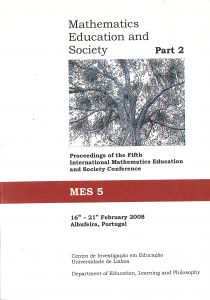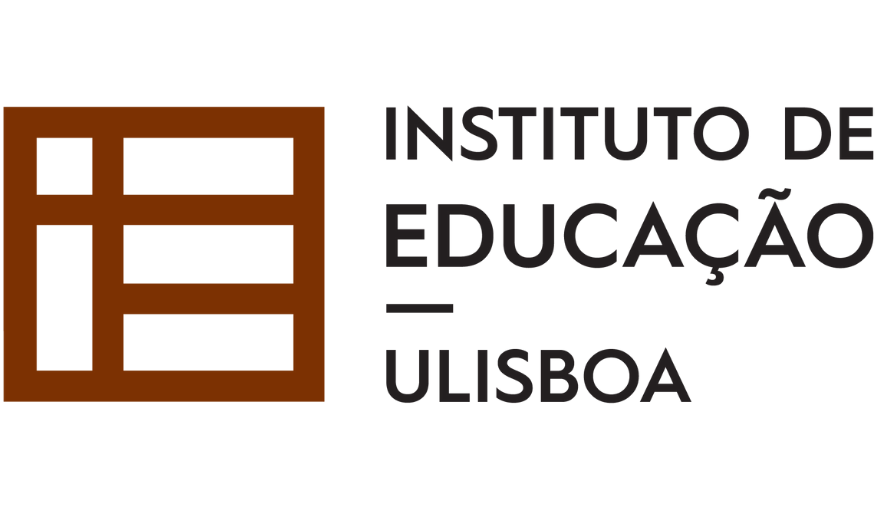Mathematics Education and Society – Part 2

Mathematics Education and Society: Proceedings of the Second International Mathematics Education and Society Conference – Part 2
Editores
João Filipe Matos
Paola Valero
Keiko Yasukawa
Índice
| INTRODUCTION | 1 | ||
| PLENARY AND REACTION PAPERS | 7 | ||
| E. (Rico) Gutstein | 9 | ||
| Reinventing Freire: Mathematics education for social transformation | |||
| A. Pais | 25 | ||
| Reinventing school? Reaction to Eric Gutstein ‘s “Reinventing Freire: Mathematics education for social transformation” | |||
| K. Brodie | 31 | ||
| Describing teacher change: interactions between teacher moves and learner contributions | |||
| M. Belchior | 51 | ||
| Making sense of Mr. Peter classroom | |||
| M. Jurdak | 56 | ||
| Equity-in-Quality: Towards a theoretical framework | |||
| E. de Freitas | 74 | ||
| Response to “Equity-in-Quality: Towards a theoretical framework” | |||
| O.R. Christensen | 78 | ||
| Order of the world or order of the social – a Wittgensteinian conception of mathematics and its importance for research in mathematics education | |||
| U. Gellert | 103 | ||
| Wittgenstein in support of a social agenda in mathematics education. A Reaction to Ole Ravn Christensen | |||
| SYMPOSIA PAPERS | 109 | ||
| J. Adler, J. Evans, P. Gates, C. Kanes, S. Lerman, C. Morgan, A. Tsatsaroni, and R. Zevenbergen | 111 | ||
| Social Theory and research in MES | |||
| A. Brantlinger and L. Cooley | 113 | ||
| No teacher candidate left behind – a study of the largest mathematics alternative certification program in the United States | |||
| M.C.S. Domite, M.C. Fantinato, W.N. Gonçalves and M. Mesquita | 118 | ||
| The social transformation as object of studies and practices | |||
| E. Jablonka, U. Gellert, C. Knipping and D.A. Reid | 122 | ||
| The production of legitimate text and the stratification of achievement in mathematics classrooms | |||
| J.F. Matos, M. Santos, E. Fernandes, S. Carreira, M. Belchior, N. Pedro, H. Gerardo, M. Mesquita, A. Pais, A.S. Alves, T. Faria, T. Silva, N. Amado, J. Amorim and R. Mestre | 125 | ||
| Learning Mathematics and competences: Bringing together three theoretical perspectives | |||
| K.. Nolan, E. de Freitas, T. Brown, O.R. Christensen, P. Ernest, S. Graham, D. Stentoft, P. Valero, S. Ler an and E. (Rico) Gutstein | 128 | ||
| A Symposium on opening the research text: Critical insights and in(ter)ventions into mathematics education | |||
| PROJECT DISCUSSION PAPERS | 133 | ||
| T. Brown | 135 | ||
| Conceptualising improvement in curriculum reform: Against consensus | |||
| U. Gellert | 140 | ||
| Cognitive academic language proficiency in primary mathematics classrooms | |||
| S.R.W. Graham | 144 | ||
| Developing a complex mathematical learning community: (re)considerations of learning/teaching experiences | |||
| R.Guambe | 149 | ||
| Students’ disposition for de-contextualised and algebraic (symbol-based) reasoning in relation to their socio-economic and cultural background in Mozambique | |||
| B. Mutemba and E. Jablonka | 154 | ||
| The interpretational space in the curriculum: intentions and interpretations of mathematical reasoning in the new curriculum for secondary schools in Mozambique | |||
| P. Valero | 158 | ||
| In between reality and utopia: A socio-political research agenda for mathematics education in situations of conflict and poverty | |||
| REGULAR PAPERS | 165 | ||
| S. Anastasiadou | 167 | ||
| The effects of representational systems on the learning of statistics between Greek primary school students and immigrants | |||
| J. Araújo | 177 | ||
| Contradictions in mathematical modelling activities from a critical mathematics education perspective | |||
| M. Chartres | 186 | ||
| Are my students engaged with critical mathematics education? | |||
| D. Chassapis and E. Chatzivasileiou | 197 | ||
| Socio-cultural influences on children’s conceptions of chance and probability | |||
| H.N. Cury and LN. Ogliari | 207 | ||
| Critical mathematical education and STS studies: Approaches to discuss a research | |||
| M.C.S. Domite and V. de Carvalho | 217 | ||
| Teacher education and culture: understanding and asking for changes | |||
| M.C. Fantinato | 228 | ||
| Teachers’ practice under the ethnomathematical perspective: A study case in young and adult education | |||
| E. Fernandes | 237 | ||
| Rethinking success and failure in mathematics learning: the role of participation | |||
| C. Frade and D. Faria | 248 | ||
| Is mathematics learning a process of enculturation or a process of acculturation? | |||
| REGULAR PAPERS (CONTINUATION IN PART 2) | 259 | ||
| M. Frankenstein | 261 | ||
| Quantitative form in arguments | |||
| E. de Freitas | 272 | ||
| Enacting identity through narrative: Interrupting the procedural discourse in mathematics classrooms | |||
| P. Gómez | 283 | ||
| Toward a methodology for exploring mathematics preservice teachers’ learning from a sociocultural perspective | |||
| B. Greer | 293 | ||
| Discounting iraqi deaths: a societal and educational disgrace | |||
| W. Higginson | 302 | ||
| Toward a theory of maesthetics: Preliminary considerations of the desirability of bringing an aesthetic perspective to mathematics, education and society | |||
| G. Knijnik | 312 | ||
| Landless peasants of Southern Brazil and mathematics education: a study of three different language games | |||
| C. Knipping, D.A. Reid, U. Gellert and E. Jablonka | 320 | ||
| The emergence of disparity in performance in mathematics classrooms | |||
| I. Lavy and A. Shriki | 330 | ||
| Social and didactical aspects of engagement in innovative learning and teaching methods – The case of Ruth | |||
| K. Le Roux | 340 | ||
| Relevance and access in undergraduate mathematics: Using discourse analysis to study mathematics texts | |||
| S. Lerman and A. Marcou | 352 | ||
| Are all studies on equity in school mathematics equal? | |||
| A. Llewellyn | 362 | ||
| ‘Maths with Sam and Alex’: A discussion of choice, control and confidence | |||
| R. Machado and M. César | 376 | ||
| Broccoli and Mathematics: Students’ social representations about mathematics | |||
| J.F. Matos and M. dos Santos | 386 | ||
| Activity, artefacts and power: Contribution of activity theory and situated learning to the analysis of artefacts in mathematical thinking in practice | |||
| K. Nikolantonakis and Ch. Lemonidis | 398 | ||
| Multiculturalism, history of mathematics and schoolbook of the third class in primary school in Greece | |||
| K. Nolan | 406 | ||
| Theory-practice transitions and dis/positions in secondary mathematics teacher education | |||
| A. Pais and M. Mesquita | 416 | ||
| If school is like this, there is nothing we can do: some thoughts | |||
| A.B. Powell and A. Brantlinger | 424 | ||
| A pluralistic view of critical mathematics | |||
| B. Savizi, T. Hajjari and A. Shahvarani | 434 | ||
| Situated decision making in mathematics education | |||
| A. Shriki and I. Lavy | 444 | ||
| Teachers as partners for designinf professional development programs | |||
| L. Teles and M. César | 455 | ||
| Batiks: How to learn mathematics a different way and in a particular scenario | |||
| M. Vlachou | 465 | ||
| The assessment discourse of teachers’ textbooks in primary school mathematics | |||
| F. Walls | 475 | ||
| Children talk about mathematics assessment | |||
| F. Walls | 485 | ||
| “Down in the dark zone”: teacher identity and compulsory standardised mathematics assessment | |||
| K. Yasukawa, J. Widin and A. Chodkiewicz | 495 | ||
| The benefits of adults learning numeracy | |||
| R. Zevenbergen | 505 | ||
| The dilemmas of indigenous education: The passion for ignorance | |||
| LIST OF PARTICIPANTS | 515 | ||
Editora e data de publicação
Ano de publicação: 2008
Editora: CIEFCUL & Department of Education, Learning and Philosophy, Aalborg University

